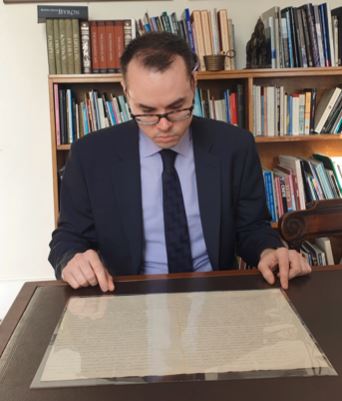Ta Nea, 12 March 2019
Greece’s daily newspaper, Ta Nea, has seen, studied and photographed the controversial ‘firman’, the Ottoman document used by Lord Elgin to remove the Parthenon Sculptures and bring them to London. It is the Italian version of the ‘firman’ which was acquired by the British Museum 13 years ago and has since been kept in its Department of Greek and Roman Antiquities.
 Ioannis Andritsopoulos,Ta Nea's UK Correspondant
Ioannis Andritsopoulos,Ta Nea's UK Correspondant
The original ‘firman’ allegedly written in the Ottoman language has been lost, with several experts questioning both if it ever existed and the authenticity of the document currently held in London. The so-called firman played a key role in the House of Commons’ decision to buy the Sculptures from Elgin in 1816.
To read Yannis Andritsopulos' article in Ta Nea, follow the link here.
Several historians and lawyers cast doubt on whether Elgin legitimately removed the Marbles from the Acropolis site.
“Concerning the precise wording of the two 'firmans' (legally binding official royal permits) that the Ottoman Sultanate is said to have granted to His Britannic Majesty's Ambassador to the Sublime Porte (Thomas Bruce, the 7th Lord Elgin), all or almost all is smoke and mirrors. For no literal transcripts of the original Turkish documents exist - or are known to exist - today. One thing, however, all sane commentators agree on: no firman can possibly have granted Elgin explicit permission to do what he and his agents in fact did, namely destroy rather than remove to safekeeping significant portions of the original Parthenon marbles.”, said Paul Cartledge, A.G. Leventis Professor of Greek Culture emeritus, University of Cambridge, and Vice Chairman of the British Committee for the Reunification of the Parthenon Marbles.
 Professor Paul Cartlege
Professor Paul Cartlege
“The so-called 'firman' was an official communication from the Grand Vizier or in his absence his deputy to the Governor and Judge of Athens. It was not, as has been claimed by staff of the British Museum 'permission given to Lord Elgin'. Plentiful contemporary historical sources confirm that the local Ottoman officials exceed the terms of the document, as the Ottoman Government itself acknowledged. It was their understanding that the pieces had been removed 'without remonstrance' that persuaded a Parliamentary Select Committee in 1816 to recommend the purchase of the Elgin collection. They had, of course, no authority to pronounce on Ottoman law, nor did their decision to waive doubts about legality, on which they did not make a recommendation, amount to asserting legal ownership. What some may take from Dr Fischer's remark is that he is claiming that an act of the British Parliament could somehow give legitimacy to a messy business of what in modern terms would be described as bribes, threats, and political pressures” commented renowned William St. Clair, senior research fellow at the Institute of English Studies, School of Advanced Study, University of London.
 William St Clair
William St Clair